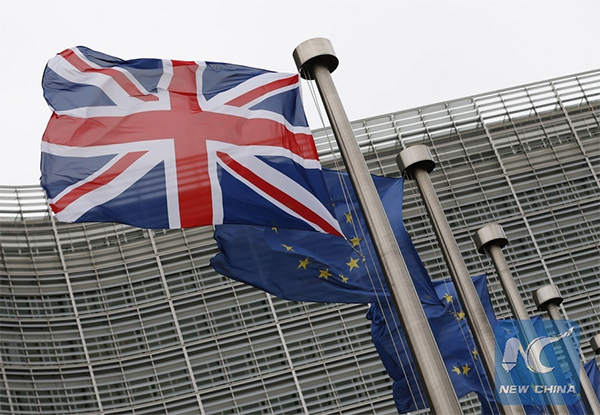Brexit unlikely to be a Lehman Bros moment
Updated: 2016-06-28 10:42
By Adam Slater(China Daily)
|
||||||||
 |
|
Photo taken on Jan. 29, 2016 shows the UK and EU flags outside the European Commission headquarters in Brussels, Belgium.[Photo/Xinhua] |
The surprise United Kingdom referendum for Brexit caught markets on the hop. Although some of the initial falls in markets have already been trimmed, market reaction since the referendum is a continuation of the pattern seen in the weeks leading up to the vote, when markets gyrated in line with the shifting fortunes of the "Remain" and "Leave" campaigns.
In our (Oxford Economics) view, these market swings are hard to square with any likely impact on the UK economy from Brexit. The UK accounts for only 3.5 percent of world output, and studies (including our own) looking at the economic impact of Brexit in the UK are mostly arguing about a few percent plus or minus on GDP in the long term.
Market gyrations after the vote encompassed currencies, bank shares and bond markets — in particular, bond spreads in some of the fiscally weaker eurozone states widened notably.
The scale of some of these moves was comparable to those seen during the Lehman Brothers collapse in September 2008, with currency market moves if anything more marked. An important difference, though, is the weakness of some eurozone bond markets; in 2008, bond yields fell across most advanced economies.
How do we interpret this pattern of market moves? It appears that markets are placing considerable weight on the possibility that Brexit is a moment of systemic importance in financial markets. But the nature of the systemic risk is different to 2008. Markets seem to be concerned that the UK vote will trigger some kind of political chain reaction in the rest of the EU that leads to very serious financial instability: either a collapse of the single currency area, a restructuring of "peripheral" eurozone countries' debt, or both.
These are the kinds of things that would need to be on the cards to justify such extreme market moves: it was fears about such outcomes that generated the eurozone financial crisis of 2011-12.
This negative "chain reaction" scenario for the EU has gained credence in recent weeks as signs of public discontent with the EU have appeared in countries beyond the UK, including France, the Netherlands and even Italy. It is also true that the eurozone "peripheral" debt market (encompassing Italy, Spain, Greece and Portugal) is large at €3 trillion ($3.31 trillion) so that debt write-downs here would imply heavy losses for global investors. There is also the thorny issue of high bad debts at Italian banks, estimated at €360 billion (18 percent of loans).
But while it is possible to sketch out a scenario in the EU that might justify large market moves like those seen just after the UK referendum result, how likely is such a scenario?
We do not think the risk is very high. A lot would have to go badly wrong at once and there are several points at which crisis risks can be reduced before it becomes irreversibly systemic.
First, the probability of knock-on referendums leading to other EU members exiting is relatively small in our view; apart from anything else, the EU countries will be very keen to avoid this even if it means granting member states significant concessions on issues such as migration/free movement to head off populist sentiment.
Second, even if further referendums go ahead, a leave vote is much less likely than in the UK. As Greece has shown, the belief in a European vision remains very strong in the eurozone periphery, and can outweigh even very strong resentment of austerity.
Third, policymakers have further scope to alleviate financial stress. The European Central Bank showed in 2012 that it is willing to step in to buy up sufficient volumes of sovereign debt to head off an upward spiral in yields. ECB President Mario Draghi's "whatever it takes" formula worked in 2012 and there is no reason why it should not work now. There is also scope for fiscal solutions, including increased debt mutualization and the state purchase of bad debt from Italian banks, if necessary. These may have a cost in terms of long-term growth in the rest of the EU but it is not going to be a very large one.
So overall, we see the immediate market moves in response to Brexit as an overreaction. The UK vote is not a "Lehman's moment". It would make sense, nevertheless, for eurozone policymakers in particular to quickly reassure markets about their readiness and capacity to prevent any re-run of the 2011-12 scenario.
The author is lead economist at Oxford Economics.
- Hillary Clinton boasts double-digit lead over Trump: poll
- First New York Pride March since Orlando shooting targets gun control
- Intl experts question proceedings of South China Sea arbitration
- South China Sea tribunal has no legal validity
- Cambodia positions itself along new Silk Road: media
- UK opposition leader Corbyn says will not resign after Brexit vote

 Made-in-China regional jet starts commercial operation
Made-in-China regional jet starts commercial operation
 Iceland shock England 2-1 to reach quarterfinals
Iceland shock England 2-1 to reach quarterfinals
 Former NBA player Kobe instructs young players
Former NBA player Kobe instructs young players
 The world in photos: June 20-26
The world in photos: June 20-26
 Panama Canal opens with Chinese ship making first passage
Panama Canal opens with Chinese ship making first passage
 Eco-friendly farming system introduced to NE China
Eco-friendly farming system introduced to NE China
 UK votes to LEAVE the EU in historic referendum
UK votes to LEAVE the EU in historic referendum
 Aussie Ben Simmons picked by 76ers as No 1 in NBA Draft
Aussie Ben Simmons picked by 76ers as No 1 in NBA Draft
Most Viewed
Editor's Picks

|

|

|

|

|

|
Today's Top News
Abe's blame game reveals his policies failing to get results
Ending wildlife trafficking must be policy priority in Asia
Effects of supply-side reform take time to be seen
Chinese State Councilor Yang Jiechi to meet Kerry
Chinese stocks surge on back of MSCI rumors
Liang avoids jail in shooting death
China's finance minister addresses ratings downgrade
Duke alumni visit Chinese Embassy
US Weekly

|

|







